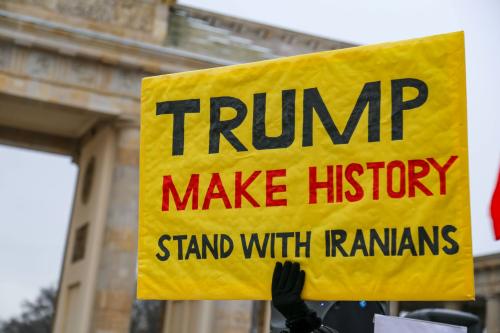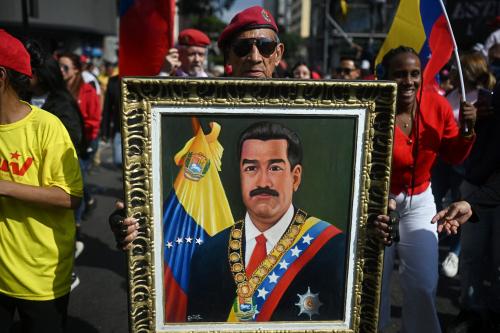Editors’ Note: On March 23, the Working Group on Egypt sent a letter to President Obama urging him to publicly and privately object to Egyptian President Abdel Fattah el-Sissi’s accelerating crackdown on human rights and civil society organizations. Brookings senior fellow and director of the Center for Middle East Policy Tamara Wittes was among the letter’s signers, and she explains her decision to do so. The letter was originally published by the Project on Middle East Democracy (POMED).
Tamara Wittes: In a disordered Middle East, America needs anchors of stability and reliable partners to help it achieve its goals. Both are in sadly short supply.
For more than thirty years, Egypt was an anchor of stability and a reliable American partner in regional security. From the time Sadat expelled Soviet advisers and broached peace with Israel, ties with Egypt have been a core pillar of American Middle East policy. But, as my colleague Steven Cook presciently noted way back in February 2012, Egypt’s revolution accelerated the launch of what he calls a “long goodbye” between these two formerly indispensable partners. He argued back then that shifting from a “special relationship” to something more transaction would have four concrete benefits for Washington:
First, Washington will no longer be in the unseemly position of providing taxpayer largesse—however small in the grand scheme of things—to a government that resents the United States and clearly does not share its values. Second, it will provide an opportunity for a much-needed change in military-to-military relations in which the United States merely pays for the services it needs like expedited transit through the Suez Canal. Third, it is consistent with this moment of empowerment and dignity for Egyptians many of whom do not want U.S. assistance either because they believe it actually stands in the way of a democratic transition or accept Aboul Naga’s argument along with those who couldn’t care less about U.S. assistance because it doesn’t touch their lives. Finally, it will free up funds for the United States to help others who actually might want Washington’s help, perhaps the Tunisians, Moroccans, or some sub-Saharan African countries would be grateful for development assistance.
Since that blog post went up, Egypt has had three different governments and lost its place as a diplomatic and security leader in the region; while the United States has withdrawn from Iraq and begun to do the same in Afghanistan, while emphasizing burden-sharing in its new fight against ISIS. All of these shifts strengthen the argument for a more distant and transactional U.S.-Egyptian relationship.
Moreover, since his accession to power (first in a military coup in July 2013 and then in a highly constrained election in 2014), President Abdel Fattah el-Sisi has made decisions that are undermining both Egypt’s domestic stability and key American policy goals in the region.
- Sisi’s failure to move forward on economic reforms (recommended by leading Egyptian voices, regional supporters, and international donors) has left his country in a spiral of shrinking cash reserves, capital flight and currency devaluation that together threaten the government’s ability to import needed food and medicine and to carry out core government functions.
- Sisi’s counterterrorism campaign in the Sinai has succeeded in “making the sand jump,” as one regional security official told me, but it seems to have stoked more than tamped down the fire of violent extremism threatening both Egypt and Israel; meanwhile, its alleged military abuses have sparked a Senate request for investigation.
- The intense political polarization and relentless repression of post-coup Egypt are producing other destabilizing effects, which are detailed in the Egypt Working Group’s newest letter to President Obama posted below (I am a member of the Working Group).
To top it all off, the Egyptian government continues to throw obstacles in the road of U.S.-Egyptian cooperation. Its military resists learning from the hard-won American experience in effective counterinsurgency. Its leadership has resolutely refused to allow core bilateral aid programs, like those supporting higher education, to move forward. And at the same time, the Egyptian government continues to promote conspiracy theories about the United States to its public through media smears and show trials, and now, apparently, to its newly elected parliamentarians.
It’s long past time for the United States to undertake a strategic review of its approach to the Middle East, one focused on building anchors of stability and sustaining reliable partners in pursuit of American priorities. Egypt, as I told The New York Times, no longer qualifies as either one. That doesn’t mean the two countries can’t continue to work together in those narrow areas where they agree on interests, priorities, and approaches.
But Secretary of State Kerry’s public embrace last week of Egyptian Foreign Minister Shoukry cannot hide the facts—there is no “back to business” option for the U.S.-Egyptian relationship, and it seems increasingly clear that even direct White House engagement would not shift Egypt’s leadership off of its self-destructive trajectory. Egypt’s looming instability demands that the United States take steps now to safeguard itself from reliance on a country we cannot rescue, not least from its own leaders’ worst impulses.
March 23, 2016
Dear Mr. President,
We are writing to urge you to speak directly with Egyptian President Abdel Fattah el-Sissi and to express both publicly and privately your objection to his accelerating crackdown on human rights, including recent moves to prosecute civil society organizations. You were correct to declare in September 2014 that “America’s support for civil society is a matter of national security,” and nowhere is that more true than in Egypt today.
President el-Sissi’s campaign against civil society takes place against the backdrop of unprecedented abuses by Egyptian security forces, including extrajudicial killings, the detention of tens of thousands of political prisoners, the widespread documented use of torture, and the forced disappearances of hundreds of Egyptians. The killing of Italian student Giulio Regeni, whose tortured body appeared on a roadside near Cairo a week after his abduction in late January, has come to international attention, but many Egyptians have shared his fate since President el-Sissi came to power.
On March 24, an Egyptian court will hear a request to freeze the bank accounts and other assets of two internationally-respected human rights defenders, Hossam Bahgat and Gamal Eid, along with members of Eid’s family. Mr. Bahgat and Mr. Eid and other activists may soon be indicted and face trial for illegally accepting foreign funding—a criminal charge that violates their right to free association and could carry a sentence of up to 25 years in prison.
The imminent proceedings are a major step in Egyptian authorities’ campaign to crush the last remnants of Egypt’s independent civil society and human rights community. Egypt’s media has recently reported that dozens of organizations are under criminal investigation, essentially for their peaceful work to monitor abuses and to hold Egypt’s government accountable to its own constitution and international human rights commitments. In recent weeks, Egyptian authorities have ordered the closure of a prominent anti-torture organization, the Nadeem Center; summoned staff from several human rights organizations for interrogation; banned prominent rights activists and advocates from traveling outside Egypt in violation of the Egyptian constitution; and harassed and threatened human rights activists with arrest and violence. The media regularly propagate vitriol against human rights defenders, portraying them as traitors and security threats.
If this crackdown is allowed to reach its conclusion, it will silence an indigenous human rights community that has survived more than 30 years of authoritarian rule, leaving few if any Egyptians free to investigate mounting abuses by the state.
The current attacks on Egypt’s rights advocates are a continuation of the same criminal prosecution of American and German NGO workers in Egypt that began in 2011. That prosecution, driven by senior members of the Egyptian government still in high office today, resulted in the June 2013 criminal convictions, in a deeply flawed trial, of 43 Egyptian and international NGO staff, including 17 American citizens. President el-Sissi, who was the head of military intelligence in 2011 when Egypt’s military government launched the investigation, has refused repeated requests to overturn the convictions.
While the current crackdown is primarily targeting domestic organizations, there are indications that international NGOs may also face increased pressure, including some that currently do not even have offices or staff working in Egypt. On March 20, the newspaper Al Masry Al Youm published the names of more than 150 individuals and civil society organizations reportedly under investigation for receiving foreign funding, including prominent American and European organizations such as the Center for International Private Enterprise, the Solidarity Center, Transparency International, Save the Children, Catholic Relief Services, CARE, AMIDEAST, the National Democratic Institute, and the International Republican Institute.
Mr. President, in your September 2014 Presidential Memorandum on Civil Society, you pledged that the United States government—including you personally—would stand firmly with those in civil society facing pressure or harassment from their governments. While the past five years have been tumultuous and challenging for U.S. policy toward Egypt, this is another defining moment for the United States, a moment that tests your pledge to “stand with civil society.” Secretary Kerry’s March 18 statement of concern was welcome, but further action is urgently needed. Past practice demonstrates that when the United States government speaks clearly, in one voice, and consistently on NGO freedom and human rights in Egypt, the government in Cairo listens.
It is essential that you act to stand up for human rights, freedom of association, and the rights of both Egyptian and international civil society organizations to work together on behalf of common goals. You must make crystal clear to President el-Sissi that continued assaults on civil society, including harassment of U.S. organizations, will make it difficult for the administration to cooperate across a range of issues, including your administration’s efforts to promote American investment in Egypt and to provide financial assistance to the Egyptian government and military. If Egypt’s government continues down a path to destroy its own civil society, American support and assistance will become, in both principled and practical terms, impossible.
Sincerely,
The Working Group on Egypt
The Brookings Institution is committed to quality, independence, and impact.
We are supported by a diverse array of funders. In line with our values and policies, each Brookings publication represents the sole views of its author(s).




Commentary
The United States can’t save Egypt from itself
April 4, 2016